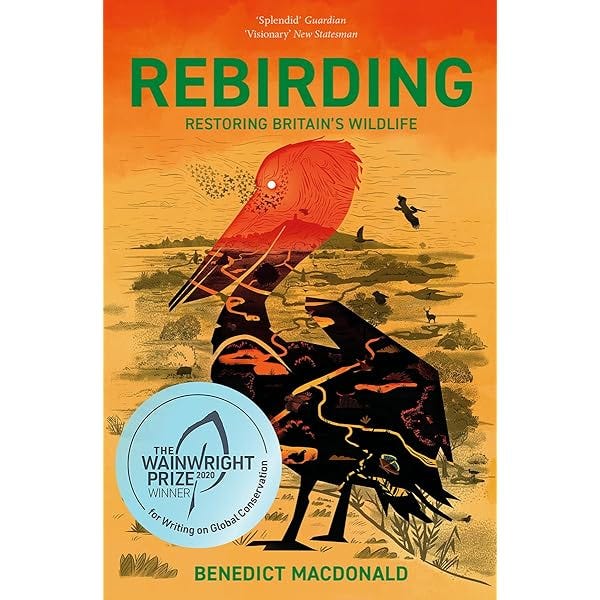Fieldwork: Rebirding, by Benedict Macdonald
An inspiring vision for how we could rebird our landscape; a depressing tale of how we’ve abused our countryside for centuries
Having committed to a rewilding project as the background for Fieldwork, I’ve been looking out for books to read to give me a clearer understanding of what rewilding really is. So I was delighted to come across Rebirding by Benedict Macdonald, winner of the Wainwright Prize for Writing on Global Conservation.
The good bit about this book is that Macdonald provides some very clear, detailed and optimistic scenarios for how we could rewild places like the Highlands, Wales, and the Somerset Levels. Doing so would not just be good for our landscapes and the wildlife that depends on them, but for local communities as well.
In Wales, for example, 88 percent of the land is taken up by livestock farming, but that industry employs just 1.9 percent of the population and contributes a measly 0.7 percent to the Welsh economy. Wouldn’t it be better to regenerate rural jobs in Wales through rewilding? To create reliable, long-term jobs in conservation and ecotourism? Macdonald lays out a compelling case for how we could not just enrich our countryside and national parks, but also improve employment and rural economies through rewilding. Who wouldn’t love to see and, indeed, pay to see golden eagles soaring over Eryri?
Restoring nature’s engineers, beavers, to Somerset would have significant benefits for local communities. If we paid farmers in the lowlands to wind up their farms, beavers could be allowed to do their thing: creating natural dams and ponds, slowing runoff and protecting towns and villages from flooding.
On flat land, rivers naturally meander. They find a channel, flow nicely for a bit, then sediment build up causes them to jump course, leaving ox-bow lakes and wide, braided channels. When we drain land and straighten rivers we make trouble for ourselves. That was something I learnt in my geology degree 35 years ago.
Today, climate change is amplifying that trouble. Flooding is only get worse as we see stronger storms and more rain due to climate change. Whilst we could spend billions on flood defences, we could also choose to put that money into supporting the transition of the farming industry, which as in Wales is struggling in the Somerset Levels, into conservation and ecotourism. It makes so much sense for us to return the Levels to wetlands and allow nature to flourish where farming cannot.
Another takeaway from this book is that we don’t just need one type of habitat. This is not about covering Britain in woods. Indeed, if we optimise for one species in one kind of habitat, then we’re going to make problems for others. So we need to think about a mosaic of habitats – some dense forest, some open woods, some wooded pasture, some savannah, some ponds, some wetlands… you get the gist.
We also need to tackle our deer problem. We have way, way too many deer and they do a huge amount of damage to our ecosystems by browsing on saplings and new shoots, preventing plants from growing. That’s critical when we’re talking about flowering plants, which support our falling insect population. Turning deer into venison is not just good for our countryside, it’s good for us, too: venison is tasty and far healthier to eat than beef. Eating wild-grown venison is a great thing to do for the environment!
There’s so much more in this book, though, I can’t really summarise it all. But although Macdonald has some compelling visions for how we could transform our country into a haven for both humans and wildlife, you do have to wade through a lot of very difficult reading to the there. The first two thirds of the book are a catalogue of all the ways that we have senselessly destroyed our countryside and wildlife. In 1532, for example, there was a four penny bounty for hedgehogs, because of the stupid belief that they stole milk from cows overnight.
This compendium of idiocy is a tough read. Indeed, I think I’d probably have given up if I hadn’t had a very good reason to continue. I’m glad I did persist, but as well written as it is, I don’t think Rebirding is going to win any new hearts or minds. Macdonald is clearly passionate and knowledgeable, but as inspiring as his future scenarios are, this book’s weakness is the waggy-finger first half. There’s no leavening hope or positivity in the first 100 pages at least, and it was hard going.
Rebirding is worth reading, and there’s a huge amount of valuable information in its pages, but make sure you’ve got your mental galoshes on for the first half.




